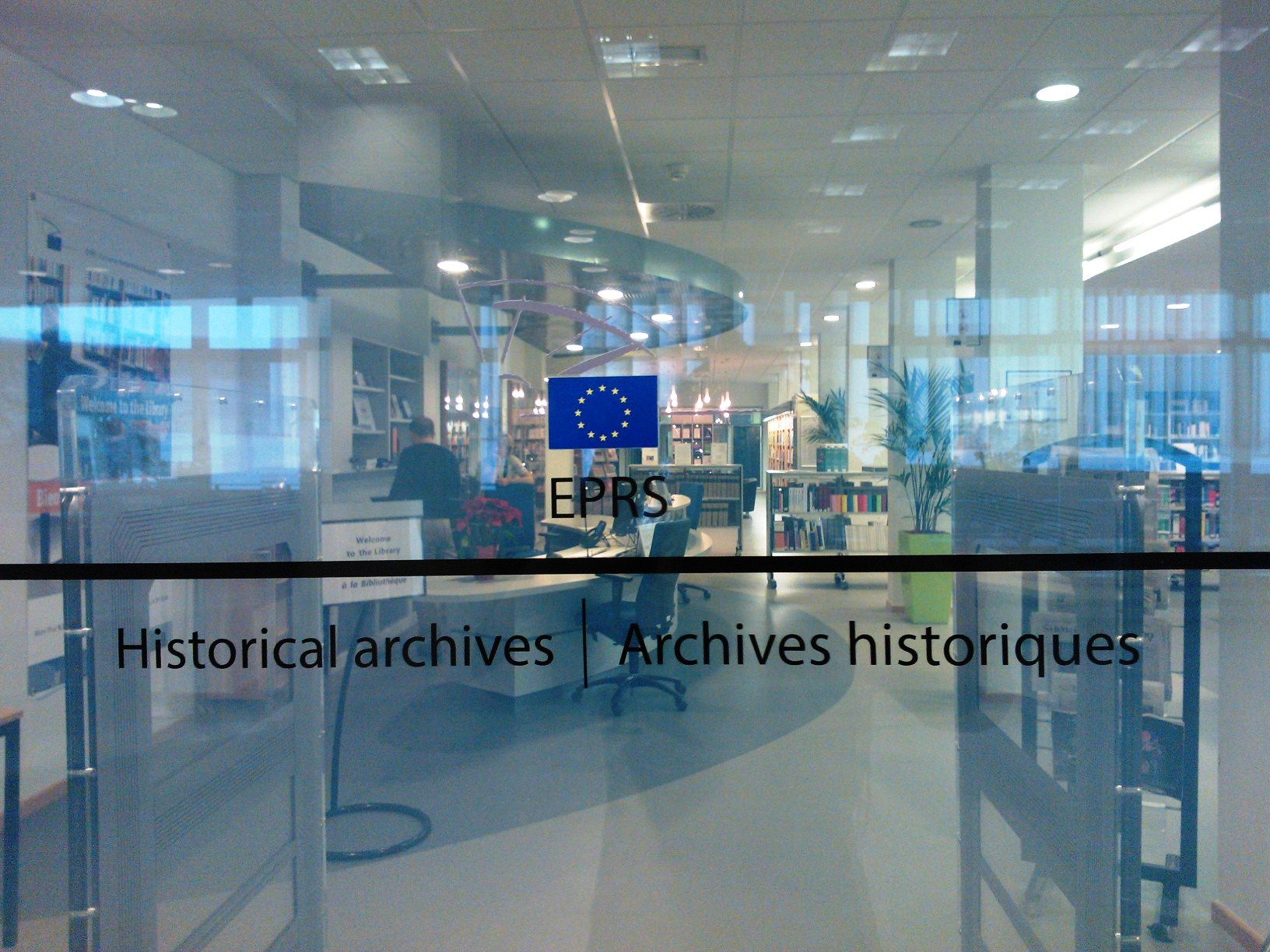Written by Alexandra Devantier
2014 was an exciting year of rebranding and new visibility for the Historical Archives (formerly known as Archive and Documentation Centre, CARDOC), now part of the European Parliamentary Research Services. Through publications, events, exhibitions and info sessions we bring the fascinating world of our archives closer to all those willing to learn more about the history of the European Parliament.
 As you might know from the blog post on our unit, the Historical Archives of the European Parliament are not about dusty basements and old papers but rather about digital documents reflecting the history and activities of the Parliament, dating back to 1952. Only in 2014, around 84 000 documents were processed by our archivists and uploaded to our database, which already contains more than 5 million documents. Now the information is only a few clicks or an email away. Our database helps many researchers and we can even reply within 5 minutes, depending of course on the type of enquiry.
As you might know from the blog post on our unit, the Historical Archives of the European Parliament are not about dusty basements and old papers but rather about digital documents reflecting the history and activities of the Parliament, dating back to 1952. Only in 2014, around 84 000 documents were processed by our archivists and uploaded to our database, which already contains more than 5 million documents. Now the information is only a few clicks or an email away. Our database helps many researchers and we can even reply within 5 minutes, depending of course on the type of enquiry.
In 2014 we received around 700 requests from inside the EP and from all over the world, from researchers and lawyers, students and media, on many different topics: social policy, European elections, speeches by MEPs and Heads of States visiting the EP, CEE/EU relations with China or Russia, MEP activities, EP committee activities, etc.
For those wishing to delve deeper into the European integration process, we offer our Reading Room, with access to our database and to the historical collections of the EP Library. In 2014 we welcomed more than 30 visitors from all over Europe and also from China and Peru. We organised 11 info sessions related to our services for the public, such as groups of university students and colleagues from the archives of national parliaments, as well as colleagues from inside the EP and other EU institutions.
 But we do more than just organise documents and provide access to them upon request. We try to provide the public with more information through our publications. In 2014, we gave insights into the archival holdings with an article on a former EP President, Les archives historiques du Président Plumb, or reacted to important events like the elections, Direct European Elections : The history of the right to vote, the hearings of the commissioners-designate, Appointment of the Commission: Parliament’s role before 1995, or the visit of Pope Francis, Visit to the European Parliament by spiritual leaders.
But we do more than just organise documents and provide access to them upon request. We try to provide the public with more information through our publications. In 2014, we gave insights into the archival holdings with an article on a former EP President, Les archives historiques du Président Plumb, or reacted to important events like the elections, Direct European Elections : The history of the right to vote, the hearings of the commissioners-designate, Appointment of the Commission: Parliament’s role before 1995, or the visit of Pope Francis, Visit to the European Parliament by spiritual leaders.
We have also done a bit of detective work and gathered information on the youngest MEPs, on Europe’s first women, on the EU flag Blue and 12 stars: The European Flag and on The first hemicycle used by the Members for plenary sessions in Luxembourg.
We also started our new European Parliament History Series with a study on the Echelon Affair. It was an important step for us as we organised our first roundtable discussion to present the study with some important guests: among others, Mr Duncan Campbell, investigative journalist, Mr Carlos Coelho, former Chair of the Temporary Committee on Echelon, and Mr Claude Moraes, Chair of the LIBE committee. More events will be organised in 2015.
To give you an idea of possible topics for some of our publications in 2015, the European Ombudsman was first nominated in 1995, the unification of Germany took place in 1990, the Helsinki Final Act was signed in 1975 and the Schengen Agreement in 1985.
Finally we come to another important aspect of our daily: exhibitions. On the 30th anniversary of the Spinelli report on the European Union we put together a small exhibition on Altiero Spinelli, on the occasion of a visit of President Giorgio Napolitano, along with an article, The road to the 1984 Spinelli Report. We also created an exhibition for the inauguration of the Emilio Colombo Space in Strasbourg, which was later hosted by the EP Information Office in Luxembourg.

2014 was a year of European elections. The Historical Archives keep an important holding of posters starting from the first direct elections in 1979, and we put a selection of these on display for the EP Open Days in Brussels and Strasbourg. The Open Days are the perfect event for the general public to discover our activities and we try to be present each year with our publications and a team ready to offer information. We do not forget the youngsters or those wanting to have fun while learning and prepare games to test their knowledge on Europe.
So if you want to know more about us, please contact us at arch-info@ep.europa.eu follow us on the EPRS blog or visit the EP during the Open Days next year, on 2 May in Strasbourg and on 9 May in Brussels.








Be the first to write a comment.